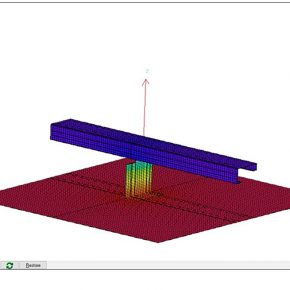
Climate change and potholes in our roads
IKO Managing Director Andy Williamson discusses the UK’s “pothole epidemic”, with more than 30,000 potholes awaiting repair.
No-matter where you are in the UK, there’s no escape from potholes at this time of year.
We expect roads to suffer normal wear and tear, but a combination of more frequent violent storms and intense rainfall caused by climate change, and ineffective temporary patching rather than proper fixing make things worse.
Figures released in November 2015 reveal a “pothole epidemic”, with more than 30,000 potholes awaiting repair in the UK, according to research by LV= Road Rescue. It costs between £50 and £60 to fix each pothole, and according to CTC, the national cycling charity, there’s an average of one road defect for every 110 metres of road in the UK. In pothole blackspots it’s very much worse. The cost of compensating drivers who claim for damage to their vehicles runs into millions of pounds. Potholes are a major factor in causing axle & suspension failure, which accounts for a third of mechanical problems on UK roads. They cost British motorists an estimated £2.8 billion a year.
We can’t stop the weather but we can deal more effectively with the damage and disruption it causes.
Year on year we see the same potholes getting bigger, getting fixed and reappearing a few weeks later. That’s partly because councils have to make rapid repairs to keep roads open and road users safe. But it’s a costly, ineffective way of dealing with the problem that lasts just until the next flood or frost ruins the road again. The porous material used to fill the pothole absorbs water into the voids and it breaks down. The edges of the pothole crumble and the hole expands.
It doesn’t have to be like this. ‘Patch Teams’ could use a modern void-less impermeable repair material which solves the problem of water and frost ingress. Preparation involves squaring the edges of the hole to make a clean edge before applying the repair material. It takes a little longer to prepare but the repair material sets quickly so the road is back in use within hours. The result is a lasting repair without resurfacing the entire road.
Why are we wasting taxpayers’ money using materials that aren’t up to the job, putting the country through this regular expensive misery? Always working as cheaply and quickly as possible is false economy. Do it once, do it right!
Latest news

26th July 2024
Enfield Speciality Doors completes world-class project for Atlas Copco HQ
A rundown office and warehouse building completely transformed into a modern headquarters for Atlas Copco has been fitted with more than 120 internal fire doors from Enfield Speciality Doors.
Posted in Access Control & Door Entry Systems, Articles, Building Industry News, Building Products & Structures, Building Systems, Case Studies, Doors, Interior Design & Construction, Interiors, Posts, Restoration & Refurbishment, Retrofit & Renovation, Security and Fire Protection, Sustainability & Energy Efficiency, Timber Buildings and Timber Products, Wooden products
26th July 2024
Abloy UK launches new white paper
Abloy UK, a leading provider of security and access control solutions, has launched a new white paper.
Posted in Access Control & Door Entry Systems, Architectural Ironmongery, Articles, Building Industry News, Building Products & Structures, Building Services, Doors, Facility Management & Building Services, Health & Safety, Information Technology, Innovations & New Products, Publications, Research & Materials Testing, Security and Fire Protection
26th July 2024
MCRMA Member Profile: David Roy, Director of Roofconsult
David Roy of MCRMA member company Roofconsult has more than 50 years’ experience to draw upon working in the building envelope sector and a unique perspective on how it has changed in that time.
Posted in Articles, BIM, Infrastructure & CAD Software, Building Associations & Institutes, Building Industry News, Building Products & Structures, Building Services, Building Systems, Cladding, Information Technology, Restoration & Refurbishment, Retrofit & Renovation, Roofs, Walls
26th July 2024
Strand: Enhancing Door Functionality and Safety
Craig Fox, Sales Director for Strand Hardware, outlines how door industry professionals might apply door limiting stays…
Posted in Architectural Ironmongery, Articles, Building Industry News, Building Products & Structures, Building Services, Doors, Facility Management & Building Services, Health & Safety, Restoration & Refurbishment, Retrofit & Renovation
 Sign up:
Sign up: